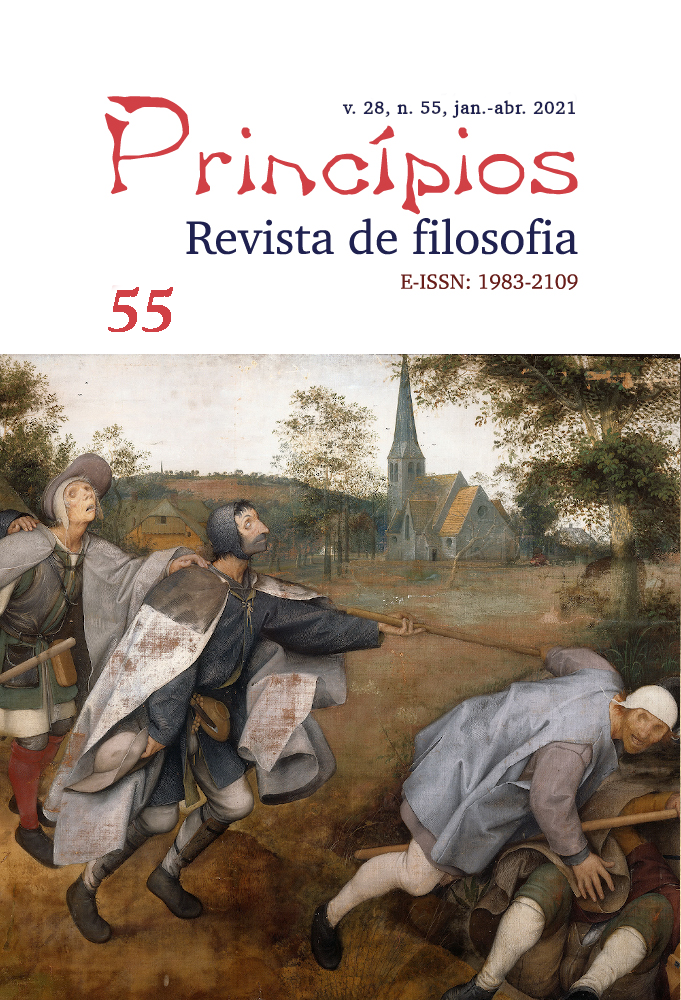Português
DOI:
https://doi.org/10.21680/1983-2109.2021v28n55ID19922Keywords:
?thos; Diabol?; Retórica judicial; Provas testemunhaisAbstract
For Aristotle, the ?thos’ proof is the most efficient persuasion mode because the speaker’s good character gives greater credibility to his arguments. In judicial rhetoric sphere, the dissymmetry between prosecutor and defendant significantly impacts his ?thos’ perception and, consequently, the receptivity of his claims. In order to acquire his confidence, the rhetor may resort to witnessing to reinforce his good character. But could they be used to arouse suspicion about the character (diabol?) of his opponent? Although the text of Rhetoric points to an affirmative view, moral perspective readers, like Grimaldi, deny this possibility. In this sense, based on considerations about the ?thos’ proof in Rhetoric, it is intended to observe if it is possible and to what extent diabol? could be used in this sphere, investigating its application from the witnesses’ proofs.
Downloads
References
ANGIONI, Lucas. Três tipos de argumento sofístico. Pelotas, Dissertatio, v. 36, p. 187-220, 2012.
BARNES, Jonathan (ed.). The complete Works of Aristotle: the revised Oxford translation. Princeton: Princeton University Press, 1984. 2v.
BRUNSCHWIG, Jacques. Aristotle’s rhetoric as a “counterpart” to dialectic. In: RORTY, Amélie Oksenberg (ed.). Essays on Aristotle’s Rhetoric. Berkeley: University of California Press, 1996, p. 34-55.
COOPER, Craig. Forensic oratory. In: WORTHINGTON, Ian (ed.). A Companion to Greek rhetoric. Oxford: Blackwell, 2007, p. 203-219.
DAY, Jane M. Rhetoric and Ethics from the Sophists to Aristotle. In: WORTHINGTON, Ian (ed.). A Companion to Greek rhetoric. Oxford: Blackwell, 2007, p. 378-392.
FORTENBAUGH, William W. Aristotle’s accounts of persuasion through character. In: FORTENBAUGH, William W. Aristotle’s practical side: on his psychology, ethics, politics and rhetoric. Leiden: Brill, 2006, p. 317-338.
GRIMALDI, SJ, William M. A. Aristotle, Rhetoric I: a commentary. New York: Fordham University Press, 1980.
GRIMALDI, SJ, William M. A. Aristotle, Rhetoric II: a commentary. New York: Fordham University Press, 1988.
GRIMALDI, SJ, William M. A. Studies in the philosophy of Aristotle’s Rhetoric. Wiesbaden: Franz Steiner Verlag GMBH, 1972.
HUTCHINSON, Douglas S. Ethics. In: BARNES, Jonathan (ed.). The Cambridge Companion to Aristotle. Cambridge, UK: Cambridge University Press, 1999, p. 195-232.
ISÓCRATES. Ad Demonicus. In: NORLIN, George. Isocrates with an English Translation in three volumes. Cambridge, MA: Harvard University Press; London: William Heinemann, 1980. Disponível em: http://data.perseus.org /texts/urn:cts:greekLit:tlg0010.tlg007.perseus-eng1. Acesso em: 22 de jan. 2020.
LIDDELL, Henry G.; SCOTT, Richard. A Greek-English lexicon (with a revised supplement). Rev. Henry S. James e Roderick McKenzie. Oxford: Clarendon Press, 1996.
SATTLER, William M. Conceptions of ethos in ancient rhetoric. Washington, Speech Monographs, v. 14, n. 1-2, 1947, p. 55-65.
UNTERSTEINER, Mario. A obra dos sofistas: uma interpretação filosófica. Tradução de Fernando Ambrósio. São Paulo: Paulus, 2012.
Downloads
Published
How to Cite
Issue
Section
License
Authors retain copyright and grant the journal right of first publication with the work simultaneously licensed under a Creative Commons Attribution License that allows others to share the work with an acknowledgement of the work's authorship and initial publication in this journal.


 Português (Brasil)
Português (Brasil) English
English Español (España)
Español (España) Français (Canada)
Français (Canada)


